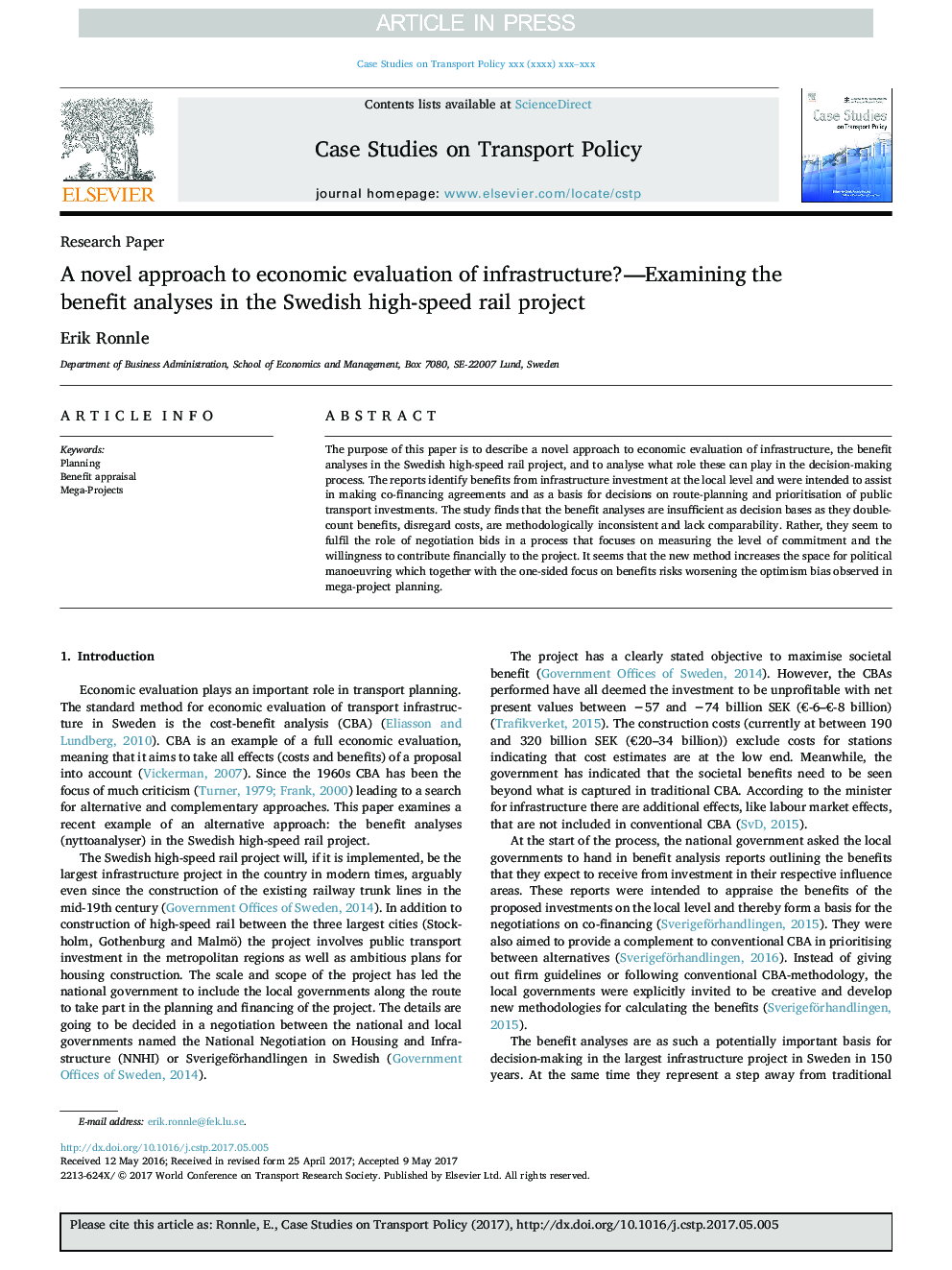| کد مقاله | کد نشریه | سال انتشار | مقاله انگلیسی | نسخه تمام متن |
|---|---|---|---|---|
| 4911622 | 1428483 | 2017 | 7 صفحه PDF | دانلود رایگان |
عنوان انگلیسی مقاله ISI
A novel approach to economic evaluation of infrastructure?-Examining the benefit analyses in the Swedish high-speed rail project
ترجمه فارسی عنوان
یک رویکرد جدید به ارزیابی اقتصادی زیرساخت؟ - بررسی مفاهیم در پروژه سریع راه آهن سوئد
دانلود مقاله + سفارش ترجمه
دانلود مقاله ISI انگلیسی
رایگان برای ایرانیان
کلمات کلیدی
برنامه ریزی، ارزیابی مزایا، مگا پروژه ها،
ترجمه چکیده
هدف از این مقاله توصیف یک رویکرد جدید به ارزیابی اقتصادی زیرساخت ها، تجزیه و تحلیل سود در پروژه سرعت راه آهن سوئد و تجزیه و تحلیل نقش آن در فرایند تصمیم گیری می باشد. این گزارش ها مزایای سرمایه گذاری زیرساختی را در سطح محلی مشخص می کند و در نظر گرفته شده است تا به ایجاد موافقت نامه های همکاری و کمک به تصمیم گیری در مورد برنامه ریزی مسیر و اولویت بندی سرمایه گذاری های حمل و نقل عمومی کمک کند. مطالعه نشان می دهد که تجزیه و تحلیل مزایا به عنوان مبنای تصمیم گیری کافی نیست زیرا آنها مزایا را دو برابر می کنند، هزینه های نادیده گرفته شده، روش متداول متناقض و عدم مقایسه است. در عوض، به نظر می رسد که نقش پیشنهاد های مذاکره در یک فرآیند که بر اندازه گیری سطح تعهد و تمایل به مشارکت مالی در پروژه تمرکز دارد، برآورده می شود. به نظر می رسد که روش جدید فضای مانور سیاسی را افزایش می دهد که همراه با تمرکز یک طرفه بر مزایا مملو از منع گسترش خوش بینی در برنامه ریزی مگا پروژه است.
موضوعات مرتبط
مهندسی و علوم پایه
سایر رشته های مهندسی
مهندسی عمران و سازه
چکیده انگلیسی
The purpose of this paper is to describe a novel approach to economic evaluation of infrastructure, the benefit analyses in the Swedish high-speed rail project, and to analyse what role these can play in the decision-making process. The reports identify benefits from infrastructure investment at the local level and were intended to assist in making co-financing agreements and as a basis for decisions on route-planning and prioritisation of public transport investments. The study finds that the benefit analyses are insufficient as decision bases as they double-count benefits, disregard costs, are methodologically inconsistent and lack comparability. Rather, they seem to fulfil the role of negotiation bids in a process that focuses on measuring the level of commitment and the willingness to contribute financially to the project. It seems that the new method increases the space for political manoeuvring which together with the one-sided focus on benefits risks worsening the optimism bias observed in mega-project planning.
ناشر
Database: Elsevier - ScienceDirect (ساینس دایرکت)
Journal: Case Studies on Transport Policy - Volume 5, Issue 3, September 2017, Pages 492-498
Journal: Case Studies on Transport Policy - Volume 5, Issue 3, September 2017, Pages 492-498
نویسندگان
Erik Ronnle,
